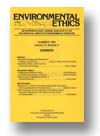|
news and notes |
|
1.
|
Environmental Ethics:
Volume >
15 >
Issue: 2
NEWS AND NOTES
view |
rights & permissions
| cited by
|
|
|
|
|
features |
|
2.
|
Environmental Ethics:
Volume >
15 >
Issue: 2
Karen J. Warren, Jim Cheney
Ecosystem Ecology and Metaphysical Ecology:
A Case Study
abstract |
view |
rights & permissions
| cited by
We critique the metaphysical ecology developed by J. Baird Callicott in “The Metaphysical Implications of Ecology” in light of what we take to be the most viable attempt to provide an inclusive theoretical framework for the wide variety of extant ecosystem analyses—namely, hierarchy theory. We argue that Callicott’s metaphysical ecology is not consonant with hierarchy theory and is, therefore, an unsatisfactory foundation for the development of an environmental ethic.
|
|
|
|
|
3.
|
Environmental Ethics:
Volume >
15 >
Issue: 2
Clive L. Spash
Economics, Ethics, and Long-Term Environmental Damages
abstract |
view |
rights & permissions
| cited by
Neither environmental economics nor environmental philosophy have adequately examined the moral implications of imposing environmental degradation and ecosystem instability upon our descendants. A neglected aspect of these problems is the supposed extent of the burden that the current generation is placing on future generations. The standard economic position on discounting implies an ethicaljudgment concerning future generations. If intergenerational obligations exist, then two types of intergenerational transfer must be considered: basic distributional transfers and compensatory transfers. Basic transfers have been the central intergenerational concern of both environmental economics and philosophy, but compensatory transfers emphasize obligations of a kind often disregarded.
|
|
|
|
|
discussion papers |
|
4.
|
Environmental Ethics:
Volume >
15 >
Issue: 2
Paul Steidlmeier
The Morality of Pollution Permits
abstract |
view |
rights & permissions
| cited by
The Clean Air Act of 1990 sets forth a system of tradable permits in pollution allowances. In this article, I examine the moral implications of such marketable allowances as a means to achieving a clean air environment. First, I examine the “ends sought” in environmental policy by discussing foundational ethical perspectives. Second, I set forth a framework for judging the moral suitability of various means. I conclude with reflections on interest group power, public policy, and the legitimacy of “second best” solutions.
|
|
|
|
|
5.
|
Environmental Ethics:
Volume >
15 >
Issue: 2
Elspeth Whitney
Lynn White, Ecotheology, and History
abstract |
view |
rights & permissions
| cited by
Controversy about Lynn White’s thesis that medieval Christianity is to blame for our current environmental crisis has done little to challenge the basic structure of White’s argument and has taken little account of recent work done by medieval scholars. White’s ecotheological critics, in particular, have often failed to come to grips with White’s position. In this paper, I question White’s reading of history on both interpretative and factual grounds and argue that religious values cannot be treated independently of the political, economic, and social conditions that sustain them. I conclude that medieval religious values were more complex than White suggests: rather than causing technological innovation, they more likely provided a justification for other activity taking place for other reasons.
|
|
|
|
|
6.
|
Environmental Ethics:
Volume >
15 >
Issue: 2
James Fieser
Callicott and the Metaphysical Basis of Ecocentric Morality
abstract |
view |
rights & permissions
| cited by
According to the theory of ecocentric morality, the environment and its many ecosystems are entitled to a direct moral standing, and not simply a standing derivative from human interests. J. Baird Callicott has offered two possible metaphysical foundations for ecocentrism that attempt to show that inherent goodness can apply to environmental collections and not just to individual agents. I argue that Callicott’s first theory fails because it relies on a problematic theory of moral sentiments and that his second theory fails because it rests on an unsupported parallel between the breakdown of the subject-object dichotomy suggested by quantum theory and an alleged actualization of morality upon the interaction of environmental collections with consciousness. Finally, I argue that Callicott overrates the need for a metaphysical grounding of inherent value, and that the metaphysical question has little bearing on the normative issue of ecocentrism.
|
|
|
|
|
book reviews |
|
7.
|
Environmental Ethics:
Volume >
15 >
Issue: 2
Alastair S. Gunn
Toward a Transpersonal Ecology:
Developing New Foundations for Environmentalism
view |
rights & permissions
| cited by
|
|
|
|
|
8.
|
Environmental Ethics:
Volume >
15 >
Issue: 2
Greta Gaard
Environmentalism and Political Theory:
Toward an Ecocentric Approach
view |
rights & permissions
| cited by
|
|
|
|
